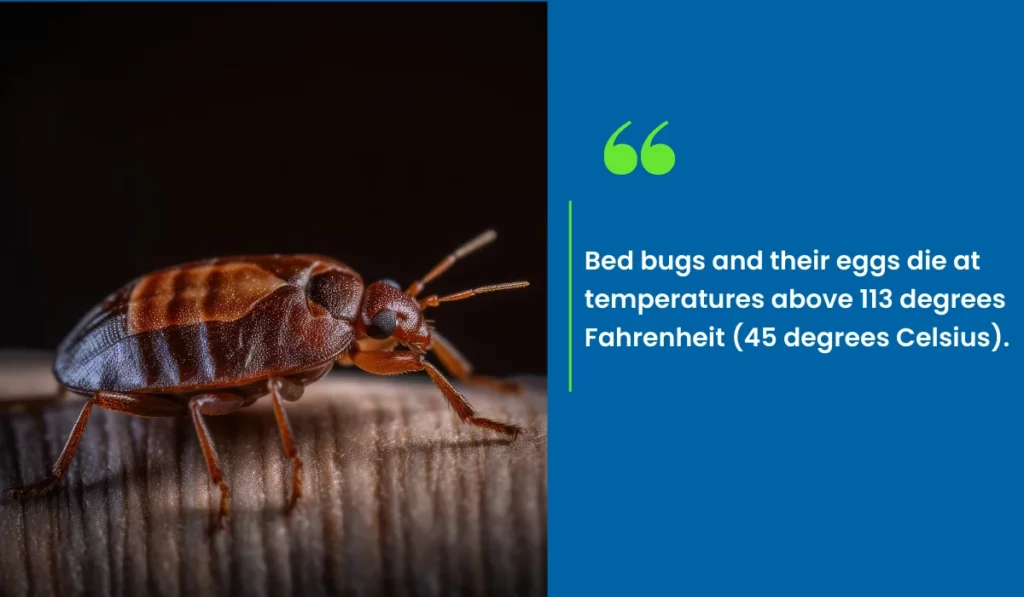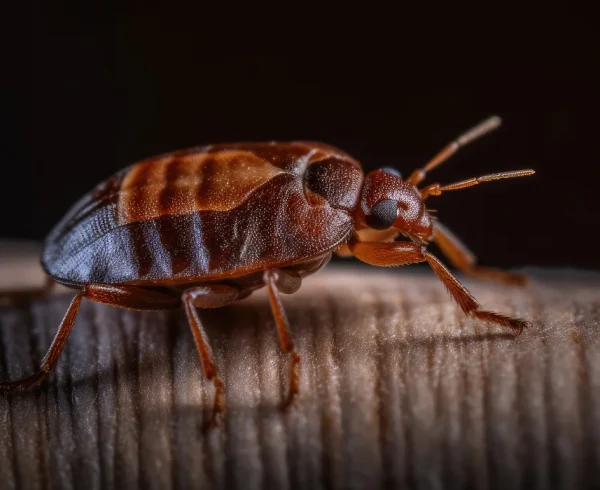Tired of dealing with those pesky bed bugs? Heat can be an effective way to get rid of these unwanted pests. Bed bugs are sensitive to heat, and can’t survive at temperatures exceeding 120 degrees Fahrenheit.
Keep reading to uncover practical tips for ensuring a bed bug-free environment.
Key Takeaways
- Heat treatment kills bed bugs by raising the temperature in a room to between 120 and 135 degrees Fahrenheit.
- Cold treatment needs temperatures below 0 degrees Fahrenheit for at least four days to work against bed bugs.
- Heat treatment works faster but costs more, while cold treatment takes longer and is better for small items.
- If temperature treatments don’t work, vacuuming, using a dryer, sealing mattresses, or calling pest control can help get rid of bed bugs.
How Does Heat Treatment Kill Bed Bugs?
Bed bug heat treatment is popular because it targets all life stages, from bed bug eggs to adults. By reaching the thermal death point, it disrupts the internal systems of bed bugs, leading to their demise.
How Hot Does It Have to Be to Kill Bed Bugs?

Reaching extreme temperatures is the key to effectively managing bed bug infestations. Bed bugs and their eggs die at temperatures above 113 degrees Fahrenheit (45 degrees Celsius).
For optimal results, professionals use specialized equipment to raise temperatures between 120 and 135 degrees F. These higher temperatures penetrate deep into mattresses, furniture, and crevices.
Such lethal temperatures make sure they cannot escape or retreat to cooler areas in a room. Specialized heat sources and fans distribute warmth evenly for whole-room heat treatments.
How Long Does It Take to Kill Bed Bugs at High Temperatures?
When considering heat treatment, exposure time is as important as temperature. Bed bugs must be exposed to high temperatures for a specific duration to be effectively eliminated.
Typically, maintaining a temperature of at least 120 degrees Fahrenheit for around 20 minutes is enough to kill adult bed bugs and their eggs. However, most bed bug treatments extend this period to make sure every last insect is removed.
When treating larger areas or heavily infested environments, professionals might extend the duration to several hours. This thorough approach guarantees the eradication of bed bugs at all stages of life.
What Cold Temperatures Kill Bed Bugs?
The survival of bed bugs when exposed to cold relies on temperature and duration. Simply lowering the temperature isn’t enough. Extreme cold over sustained periods is needed to kill them effectively.
Can Bed Bugs Survive Freezing Temperatures?
Bed bugs are tough creatures, capable of enduring very cool environments. Yet, extremely low temperatures can be fatal to them. To kill bed bugs with cold, temperatures must drop below 0 degrees Fahrenheit (-18 degrees Celsius).
So technically, yes. Freezing temperatures can kill bed bugs. However, your at-home freezer might not work for this.
What to Do When Temperature Treatments Don’t Work
Sometimes, signs of bed bugs can overwhelm homeowners, even with low and high-temperature treatments. When these bed bug control don’t work, consider these strategic steps:
- Run a vacuum over all suspected areas. Pay special attention to cracks and hidden spots where bed bugs hide.
- Place any infested bedding or clothing in a clothes dryer on high heat for at least 30 minutes. This can kill lingering bed bugs hiding in the fabric.
- Use plastic covers to seal mattresses and box springs, cutting off any remaining bugs from their food source. This step can prevent further infestation growth.
- Engage in pest management strategies focusing on removing harborage points. Seal cracks in walls or furniture where bed bugs might linger.
When to Consider Calling Pest Control Professionals
If you’re still seeing bed bugs despite your DIY solutions, it’s likely time to call a pest control professional for remediation. They have specialized techniques and tools to handle severe infestations and ensure long-term results.
Besides bed bugs, do you need help with other critters, such as cockroaches, fleas, and termites? Visit our website today for a free estimate!










